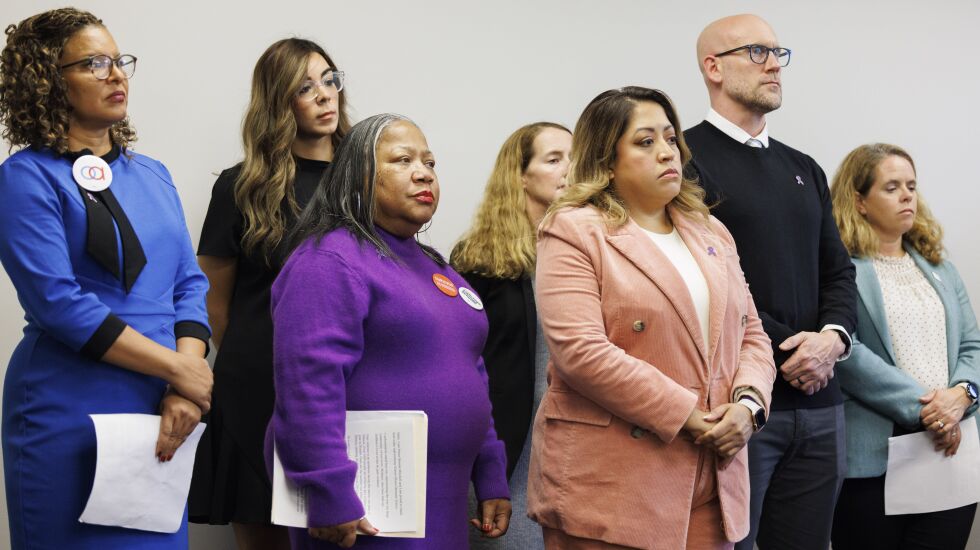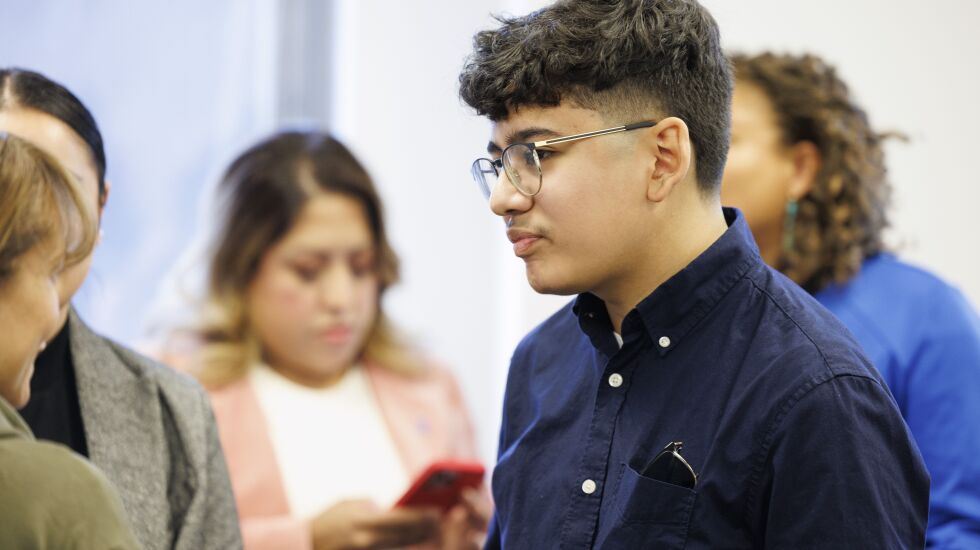
It’s been just over three months since Karina Gonzalez and her daughter were fatally shot in their Little Village home, allegedly by Gonzalez’s husband who had been ordered to stay away from them.
On Thursday, advocates said it’s time the Illinois General Assembly act on legislation aimed at removing firearms from those accused of domestic violence and better protecting victims like Gonzalez.
A bill named in her honor would require law enforcement to remove firearms when serving an emergency order of protection. It would also clarify language allowing judges to issue a search warrant when ordering removal of a gun.
“I’m here today because two of my constituents, Karina Gonzalez and her daughter, were shot and killed just a few blocks away from my district office,” state Sen. Celina Villanueva, D-Chicago, said at a press conference Thursday.
“Their murder was horrific and should have never happened. Manny, I am sorry,” Villanueva said to Gonzalez’s surviving son who was sitting in front of her.
Two weeks before the fatal shooting, Gonzalez went to Chicago police to report threatening behavior by her husband Jose Alvarez.
The next day, she went to court and was granted an order of protection against him — citing his drinking, drug use and threats. The order automatically revoked his firearm owners identification card and banned him from the family home.
But on July 3, Alvarez was still in their home and still had his Glock 9mm when he fatally shot his wife and 15-year-old daughter and wounded his 18-year-old son, according to prosecutors.

“Karina’s story is a painful reminder that the current system has failed far too many survivors of domestic violence,” said Yolanda Androzzo, executive director of One Aim Illinois. “It’s crucial to understand that this case is not an isolated incident.
“Many survivors face similar threats daily,” she said. “Without this law, the state of Illinois is putting a target on the backs of domestic violence survivors. This policy is the crucial difference between life and death for domestic violence survivors.”
Currently, an order of protection revokes a person’s FOID card but “does nothing to get guns out of the hands of those causing harm,” said Amanda Pyron, executive director of the Network, a collection of domestic violence prevention groups.
Survivors can request that a firearm be removed, but Pyron says at the moment there is no enforcement. “The firearm remedy is being applied inconsistently across the state of Illinois, often inadequately,” Pyron said.
Karina’s Bill aims to clarify and strengthen the law. When a judge grants an order of protection, a seizure order would have to accompany it and law enforcement would have 48 hours to both serve the order and seize the weapon.
“An order of protection is a key tool to help survivors, especially as they tried to leave a violent relationship,” state Rep. Maura Hirschauer, lead sponsor of the bill, said Thursday. “Right now, however, the order protection process is failing too many domestic violence survivors. When an order of protection is granted with the firearm remedy, that gun needs to be removed from the home immediately. We cannot have any ambiguity about this process — the stakes are too high.”
Karina’s Bill was part of a firearm safety package passed by the House in May but it failed to clear the Senate. Advocates hope to push it through during the fall veto session that begins this month.
Villanueva acknowledged there is still work to be done on the bill to get it passed, especially when it comes to the issue of enforcement.
The state police have the primary responsibility, under state law, but they heavily rely on local police and sheriff’s deputies to go to the home and remove a gun. As of July, in Cook County alone, there were nearly 30,000 outstanding cases of people whose FOID cards have been revoked but who likely still had guns.
In domestic violence cases, the presence of a gun in the home increases the risk of homicide by 500%, according to a report from the Network.
In Gonzalez’s case, Chicago police responded to a domestic disturbance call at the home the day after the order of protection was issued, but there’s no indication they were aware of the order or had run his name to check on outstanding warrants.
The next day, on June 23, Cook County sheriff’s deputies went to Alvarez’s home to officially serve the order of protection but he was not home. The same day, state police matched the order of protection with Alvarez’s FOID card. On June 24, they notified Chicago police and the Cook County sheriff by email.
Neither Chicago police nor the Cook County sheriff’s office could confirm they received the notification. The Sun-Times could find no record of anyone going to the home to remove the gun.







